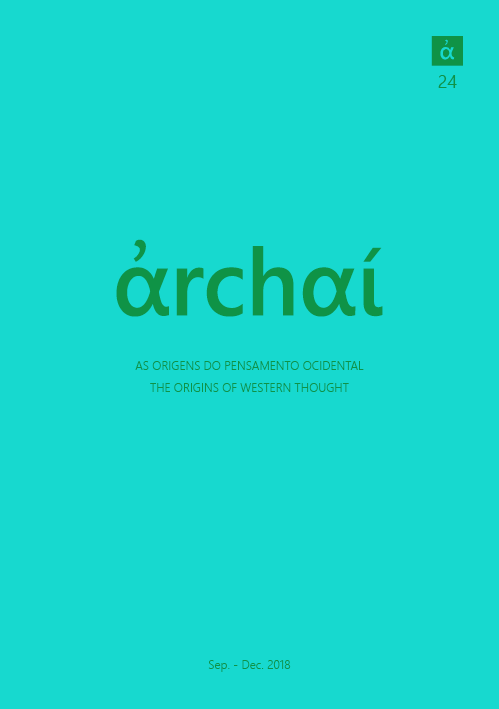The physiology of pleasure in Hippocratic medicine
models and reverberations
DOI:
https://doi.org/10.14195/1984-249X_24_1Keywords:
pleasure, medicine, Corpus HippocraticumAbstract
The main aims of this article are to demonstrate the presence of two physiological conceptions of pleasure in the Hippocratic Corpus, pointing out the differences between them and conjecturing about the reverberation of one of them in Plato’s dialogue Gorgias. We can find in texts of Greek medicine a description of pleasure produced during sexual intercourse and another related to the occurrence of pleasure during nourishment. However, the second account, unlike the first one, is strongly marked by the notion of pleasure as replenishment. Identifying a physiological conception of pleasure featured by a process of filling in the Hippocratic Corpus is relevant because a very similar conception seems to be taken as starting point by Plato in his reflections on pleasure.
Downloads
References
BOSSI, B. (2008). Saber Gozar: Estudios sobre el placer em Pláton. Madrid, Editorial Trotta.
BOUNDON-MILLOT, V. (2012). Polybe. In: GOULET, R. (dir.) Dictionnaire des philosophes antiques. Paris, CNRS Editions.
BRAVO, F. (2009). As ambiguidades do prazer: ensaio sobre o prazer na filosofia de Platão. 1ª ed. São Paulo, Paulus.
CARVALHO, M.; et al. (orgs.) (2015). Platão. Coleção XVI Encontro ANPOF: ANPOF, p. 220-228.
CAIRUS, H.; RIBEIRO J., W. (2005). Textos hipocráticos: o doente, o médico e a doença. 1ª edição. Rio de Janeiro, Fiocruz.
CANTO, M. (1993). Platon. Gorgias. Présentation et traduction. Paris, Flammarion.
CRAIK, E. (2015). The ‘Hippocratic’ Corpus: Content and context. London, Routledge.
DEAN-JONES, L. (1992). The Politics of Pleasure: Female Sexual Appetite in the Hippocratic Corpus. Helios 19, p. 72”“91.
EIJK, P. (2008). The Role of Medicine in the Formation of Early Greek Thought. In: CURD, P.; GRAHAM, D. (orgs.) The Oxford Handbook of Presocratic Philosophy. Oxford, Oxford University Press. p. 385-412.
GOSLING, J.; TAYLOR, C. (1982). The Greeks on Pleasure. Oxford, Clarendon Press.
HOLMES, B. (2010). The symptom and the subject: the emergency of the physical body in ancient Greek. New Jersey, Princeton University Press.
JOLY, R. (1970). Hippocrate. De la generation, de la nature de l’enfant, des maladies IV, du foetus de huit mois (texte établi et traduit). Paris, Les Belles lettres.
JOUANNA, J. (1999). Hippocrates. Trad. Malcolm DeBevoise. Baltimore & London, The Johns Hopkins University Press.
LEVIN, S. (2014). Plato’s rivalry with medicine: a struggle and its dissolution. Oxford, Oxford University Press.
LITTRÉ, E. (1851). Oeuvres completes d’Hippocrate. Vol. 7. Paris, Baillière.
LONIE, I. (1981). The Hippocrates treatises “On generation”, “On the nature the child”, “Diseases IV”: a commentary. Berlin & New York, De Gruyter.
LOPES, D. (2011). Platão. Górgias. Tradução, ensaio introdutório e notas. São Paulo, Fapesp.
MACÉ, A. (2009). The new frontier: philosophy of nature in platonic studies at the beginning of the XXIth Century. Plato 9, (En ligne), mis en ligne: octobre 2009. <URL = http://gramata.univ-paris1.fr/Plato/article89.html>. Consultado em: 21 de dezembro de 2016.
MUNIZ, F. (2011). A potência da aparência: um estudo sobre o prazer e a sensação nos Diálogos de Platão. Annablume, São Paulo.
SCHIEFSKY, M. (2005). Hippocrates. On ancient medicine. Translated with introduction and commentary. Leiden & Boston, Brill.
WOLFSDORF, D. (2013). Pleasure in ancient philosophy. Cambridge, Cambridge University press.
Downloads
Published
How to Cite
Issue
Section
License
Given the public access policy of the journal, the use of the published texts is free, with the obligation of recognizing the original authorship and the first publication in this journal. The authors of the published contributions are entirely and exclusively responsible for their contents.
1. The authors authorize the publication of the article in this journal.
2. The authors guarantee that the contribution is original, and take full responsibility for its content in case of impugnation by third parties.
3. The authors guarantee that the contribution is not under evaluation in another journal.
4. The authors keep the copyright and convey to the journal the right of first publication, the work being licensed under a Creative Commons Attribution License-BY.
5. The authors are allowed and stimulated to publicize and distribute their work on-line after the publication in the journal.
6. The authors of the approved works authorize the journal to distribute their content, after publication, for reproduction in content indexes, virtual libraries and similars.
7. The editors reserve the right to make adjustments to the text and to adequate the article to the editorial rules of the journal.



